If you’re like most electric guitar players, you may be asking yourself, do you really need a distortion pedal? It depends on what genre of music you play and your playing style. In this article, I’ll answer all your questions about what a distortion pedal can do for you.
Keep reading to find out all the pros and cons of pedal distortion!
You can use the table of contents below to take you to the area that interests you. Click on the little box to open it, and then click on the section of the article you want to read, or you can read from start to finish if you want the full distortion pedal experience!
The Short Answer
You need a distortion pedal if you play Rock or Metal and your amplifier cannot produce adequate distortion on its own. Distortion pedals are perfect for single-coil guitar pickups, which won’t distort your amplifier as much as high-output humbuckers. A distortion pedal can give you better control over your sound than amplifier distortion. Not every player needs a distortion pedal. It ultimately depends on your playing style and the sound you want to achieve.
Keep On Reading (Below) To Learn More
Will Distortion Enhance The Music You Play?
One of the first things electric guitar players think about getting to compliment their amp is a distortion pedal. Come on, I know you’re thinking about it, or you wouldn’t be here reading this. My first two pedals were a Maestro Fuzz-Tone and a Vox King Wah-wah.
Adding a distortion pedal probably won’t do your music any favors unless you play Rock, Metal, and maybe some Hot Country or Jazz fusion. I’ve never met a rocker that did want a distortion pedal!
However, your playing style is just as important as the music your play, so only you can decide if a distortion pedal is right for you!
Just because you add distortion, it doesn’t necessarily mean your music will sound better. In fact, if your music doesn’t sound good played clean it’ll probably sound even worse when you add distortion.
The remedy is to keep practicing until you sound great without amps and pedals! Although this is a simple concept, it took me a few months to come to terms with this as a beginning guitar player.
When To Use A Distortion Pedal
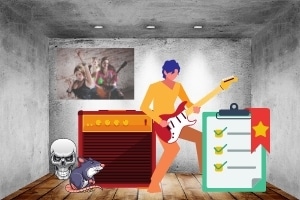
If distortion is right for you, there are three reasons to use a pedal.
When Your Amplifier Won’t Get You There
Rock and Metal players love using distortion any way they can get it, and I’m one of them!
When I first started playing, the amplifiers were designed to faithfully reproduce the guitar’s sound, so they didn’t have Master Volume controls, and distortion pedals weren’t available.
To get your distorted sound, you either had to buy a very small amp and crank it comfortably to ten or blow the windows out of the house with a larger amp like a Fender or a Marshall stack.
These days distortion pedals have made it easy to get a great Rock or Metal sound out of virtually any amp at a low volume. So you can use your favorite amp and still get the distortion you crave.
For example, this Fender 59 Bassman LTD 4 x 10-inch 45-watt tube combo amp and an overdrive or distortion pedal is a match made in heaven!
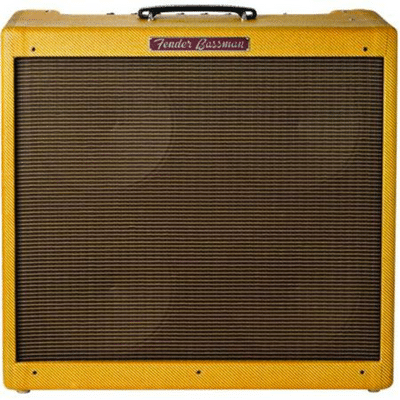
To Turbocharge Your Amp’s Distortion
Putting a distortion pedal in your signal chain can be a great way to make an already distorted amp sound even better! Go ahead, give it a try, and your already high-gain amp will make sounds you never thought possible!
It’ll push your already fire-breathing amp into warp drive and I’ll give you more info in the section below on “can you use a pedal and amp distortion together.”
To Dial In The Type And Amount Of Distortion You Need
Even if your amplifier can conjure great distortion by adjusting the Master Volume control, a distortion pedal might be just what you need to change from clean to distorted sounds on the fly without having to fiddle with the guitar and amp controls between one song and the next.
Some guitarists use their amp’s clean channel and multiple distortion pedals separately or gain-stacked together to dial in just the right amount of dirt for each tune they play.
You Don’t Always Need A Distortion Pedal
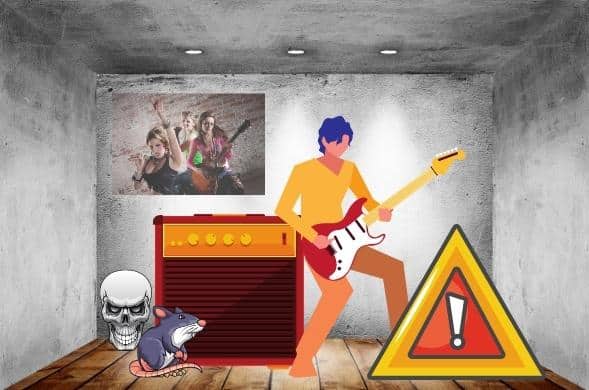
Not all types of music sound best with distortion. If you play folksy or traditional jazz, don’t even think about getting a distortion pedal!
Even if you play Rock or Metal, you might be able to get the distortion you need by using the right guitar and amplifier.
High-Output Guitars And High-Gain Amplifiers
Guitars with high-output pickups, like humbuckers or active pickups, can sound great with high-gain amplifiers without using a distortion pedal.
Look at Angus Young, the guitar player for AC/DC. He runs his Gibson SG guitar into his Marshall stacks without any pedals.
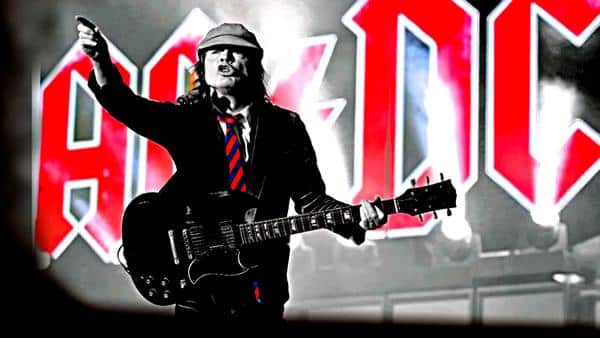
He always gets a fabulous overdriven or distorted sound from his playing technique and equipment. Angus can make a guitar dangerous without even plugging it in!
Choosing The Right Guitar For The Job
Your guitar will play a significant role in the need for a distortion pedal to get the sound you want out of your amp. The stronger the pickup output, the less likely you’ll need to use a distortion pedal to get your coveted sound.
If you play a single-coil guitar like a Strat and don’t have a high-gain amp, most of your distortion will likely come from a pedal.
For metal players, the best bet is a guitar with double-coil humbuckers that can create a distorted sound going into the pedals and amps. Many metal players favor active humbuckers, which give a darker sound, especially when tuned down.
For example, this ESP James Hetfield Signature Snakebyte Guitar will get the job done and then some! This guitar is a Heavy Metal monster! If you’re interested, you can check out the Amazon reviews by clicking the link below.
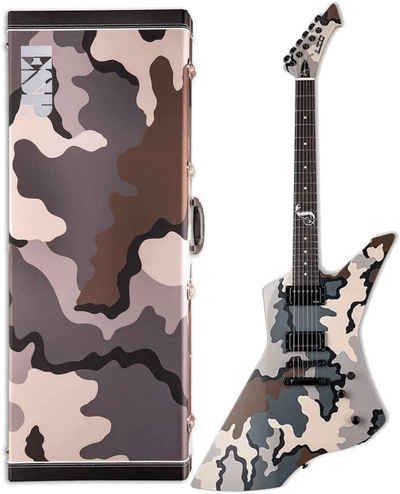
Click HERE To Check Reviews & Price On Amazon
It has two EMG JH “HET” active humbuckers with oversized ceramic and steel pole pieces that put out off the charts gain!
Modifying Your Guitar To Improve Distortion
The other option is to modify your current guitar to give it a more aggressive signal output profile. This usually means pulling the single-coil pickups out of your Strat or Tele and replacing them with something like Seymour Duncan Hot Rails or routing larger pickup holes for standard-size humbuckers.
Be aware that this can significantly lower the resale value of your guitar, not to mention you should only attempt doing it yourself with the proper tools and training!
What Is A Distortion Pedal?
Simply put, a distortion pedal pushes the amplifier’s front end hard, making your guitar signal hotter (clip). Depending on how your set the controls on the pedal and amp, the audio signal can be anything from an overdrive sound to a full-on distorted tone with lots of sustain.
Keith Richard’s opening lick to the tune “I Can’t Get No Satisfaction” is a classical use of a distortion pedal in all its glory!
All distortion doesn’t sound the same. The sound and performance are highly dependent on the individual pedal. Pedal distortion differs significantly from the distortion you get from a guitar amp.
Unlike distortion from your amp, a distortion pedal gives you the most choices for adjusting your sound. There are controls for Volume, Gain, and EQ (like bottom and middle). Some pedals give you the option of a few types of distortion.
Pedal distortion typically sounds harsher and more artificial than amplifier distortion, especially compared to an all-tube amp.
How is Distortion Different From Overdrive, Fuzz, And Metal Pedals?
The best way to think about these pedals is that they all play their part in the spectrum of boosting your guitar’s signal strength (amplitude).
Overdrive
On the low end of the spectrum is the overdrive pedal, which is like putting your guitar on steroids, keeping the sound on the clean side but giving your power chords a gnarly grit and adding rough edges and polite singing sustain to single-note work.
The sound cleans up very nicely by tweaking the guitar’s volume knob down a bit.
Distortion
Distortion pedals definitely kick things up a notch or two and put you into full Rock and Roll mode. Your sound gets bigger and meaner no matter what you play.
Here’s where single-coil versus humbucker pickups really start to make a difference. I remember plugging my Les Paul into an Electro-Harmonix Big Muff distortion pedal the first time. I couldn’t believe my ears in comparison to my Strat!
Fuzz
Fuzz is essentially a nastier version of distortion that begs to sound rude. These pedals are best used to unapologetically accent riffs or short musical passages. It can be adjusted to sound more like distortion or even a harsh overdrive by fiddling with various controls.
Metal
Metal pedals sit at the high end of the spectrum and are designed to put you in full nuclear meltdown mode! They can bring out every nuance of a note’s harmonics and turn your axe into a weapon of sonic destruction with the press of a button! They give you sustain that can last forever and total control over the whammy bar dominion!
As you move from overdrive to distortion to fuzz to metal sounds, your fingering and picking techniques must be more spot-on if you want to keep things musical. This includes the pristine dampening (muting) of all extraneous notes and noises likely to come from the guitar.
Amp-Based Distortion
Depending on the amp’s design and settings, its distortion can vary from very subtle or full-blown. It is more organic-sounding than pedal distortion.
Amps without a Master Volume control, like a Fender Deluxe Reverb, will begin to break up with overdrive or subtle distortion as the Volume control is cranked at or near 10, depending on the type of guitar you use.
High-Gain Amps
Amps with a Master Volume control, like some Marshalls, are designed to distort. The higher-gain amps distort best and are specifically designed for Rock and Metal players.
Some guitar amps have more than one channel with a dedicated distortion channel that can easily power any guitar without a pedal.
For example, the Marshall JVM410H is a 100 Watt all-tube beast with a clean, crunch, overdrive-1, and overdrive-2 channel. It might be too rich for your blood, but you can check this baby out by clicking the Amazon link below.
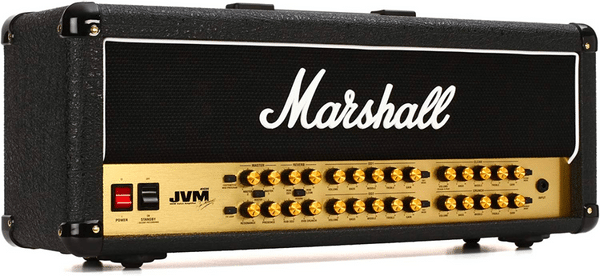
Click HERE To Check Reviews & Price On Amazon
The two overdrive channels can be gain-stacked to create a fire-breathing monster without the aid of a distortion pedal, even with low-output Strat pickups! There are similar amps available at a lower price point.
Can You Use Pedal And Amp Distortion Together?
Yes, you can definitely use pedal and amplifier distortion together, which is commonly seen among Metal players. Some players use more than one distortion pedal simultaneously (gain stacking) with the high-gain channel of the amp, depending on how much distortion they want.
Remember, the more distortion you use, the more noise you will introduce into your music, so you have to experiment with it to hear what sounds best. Always put distortion pedals between the guitar and amp, not in the effects loop. You can add a noise gait pedal to keep things under control.
I wrote an entire article on this subject; just click on the link below to learn more! It will also provide you with info and user reviews on my favorite overdrive and distortion pedals.
Related Article ➡ Pedal Vs Amp Distortion And Overdrive – Which One Is Best?
Pros And Cons Of Using Distortion
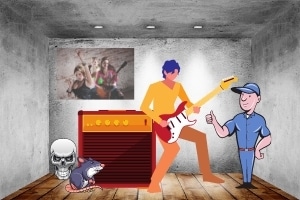
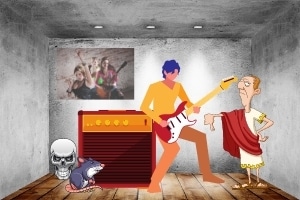
Here is a summary of how distortion can affect the music you play. You can click on each of the items below to learn more.
| Item | Pros | Cons |
|---|---|---|
| Chords | Makes power chords rock | Chords tones may lose definition |
| Notes | Great for solos | Requires muting of unwanted sounds |
| Sustain | Enhances sustain | Can make sustain harsher |
| Feedback | Easier to produce feedback | Can be challenging to control |
| Harmonics | Helps bring out harmonics | Harmonics may sound harsh |
| Pedal Distortion | Easier to dial in | Can be artificial-sounding |
| Amp Distortion | More organic-sounding than pedals | Limited distortion adjustments |
| Listener Experience | Can make the guitar stand out | Sound may become less clear |
Keep On Reading (Below) To Learn More About Each Topic
How Distortion Affects Your Music
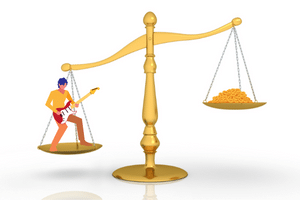
As much as I love all things distorted, there are some downsides. Let’s take a closer look at what pedal and amp distortion do to your playing.
Chords
Distortion is excellent for power chords, those two or three-note beauties that set the foundation to solo endlessly. However, it can muddy up more complex chord shapes, which can be good or bad.
Take the Dominant 7th sharp 9 (7#9), better known as the “Hendrix chord.” Can you imagine Purple Haze being played with the distortion it so richly deserves? Now try putting the same amount of distortion on a Major 7th chord. You might not like the results as much!
Notes
Single notes are much easier to deal with in “distortion land” than complex chords. Distortion can give solos a fluidity that makes them soar and beg to go on forever. It’s all about technique and muting everything that does not belong in the music. Masters of using distortion can bring out every little nuance that a note has to offer!
Sustain
When it comes to sustain, distortion will give you plenty, with some to spare. It’s what attracts players most to adding some dirt to their tunes. If you want the sustain without the harshness or distortion, you’re probably looking for a compressor pedal.
Feedback
Distortion can make it easy to add feedback in just the right places to help make your musical statement. On the other side of that coin, string muting is essential to keep feedback under control and out of the way when you don’t want it.
Ted Nugent, the “Motor City Madman,” is an excellent example of someone who uses feedback to great advantage. He plays high-octane Rock through a Gibson Byrdland hollow-body electric guitar plugged into a mountain of amps set to kill!
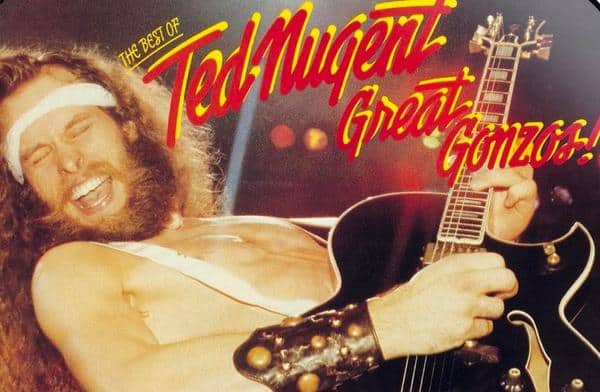
And why isn’t this man in the Rock And Roll Hall Of Fame? Can someone explain that one to me?
Harmonics
There’s nothing like a bit of distortion to make harmonics explode off the tip of your pick or coax them out of anything you tap on the fretboard. Distortion can give harmonics a totally different character, which can sound “less pure” or artificial. Under the right circumstances, this can be “just what the doctor ordered” (sorry for the pun, Ted)!
The Listener Experience Is Key!
If you use a distortion pedal always be sure that your audience is hearing what you think they’re getting!
We’ve all heard players that use so much distortion that everything is garbled to the point of being unintelligible! Some guitarists have such excellent playing technique that all the notes ring through, even with heavy distortion.
It’s a good idea to record a practice section from the audience’s location a have a listen for yourself.
Are You Qualified To Make Guitar Adjustments Or Modifications?
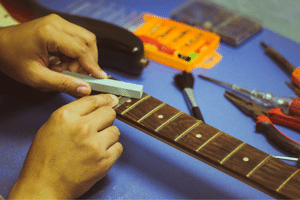
It’s great to work on your guitars, especially if you have a lot of them, but you should always be aware of your limitations.
Adjusting things like an electric guitar’s string height (action) or pickup height can be straightforward. Still, some adjustments require the proper training and experience, like adjusting a guitar’s truss rod.
If you decide to upgrade the pickups on your guitar, ensure you have the proper tools and training to avoid damaging it! Changing pickups can significantly decrease its resale value, especially if it is a vintage instrument!
When you doubt your ability to adjust, repair, or modify your guitar, it’s always best to bring it to a competent guitar technician or luthier (guitar designer & builder). You can permanently damage your guitar, and it might never play and sound right again!
Making modifications to your guitar can void its manufacturer’s warranty and cause permanent damage to the instrument. Certain modifications are irreversible, so you may be stuck with them, even if you desperately want to restore the guitar to its original condition!
I learned that the hard way over the years until I did a three-year apprenticeship in a guitar repair shop. Now I have my own home workshop with the proper training and equipment to safely maintain and repair all my instruments.
Remember: “When In Doubt, Send It Out!”
Frequently Asked Questions
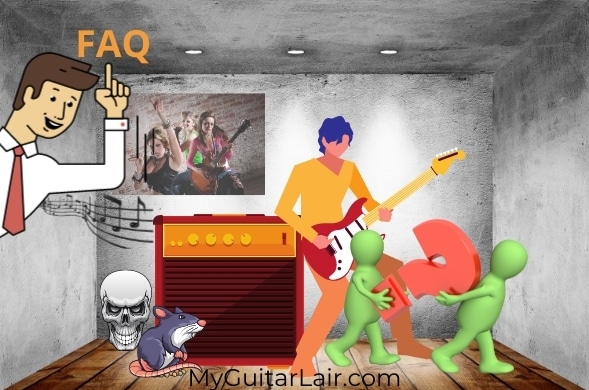
Here are some of the questions I get asked about distortion pedals.
If your question does not appear here, please put it in the comments, and I will get right back to you with an answer.
Is Distortion Better Than Overdrive?
No, not really. Distortion is just a more aggressive overdrive pedal that usually has more EQ adjustments. Some overdrive pedals can get pretty close to full-on distortion and vice-versa. Buy the pedal that best fits your genre of music and playing style!
Does Distortion Hide Your Mistakes?
No. It can make it easier to hold, bend, and apply finger vibrato to notes, but your mistakes or lack of technique will be noticeable no matter how much distortion you use. There’s no substitute for practice!
What Genres Use Distortion?
Distortion is typically used with Rock, Metal, and Punk, but it’s also used in Hot Country and Fusion. Don’t be afraid to experiment with distortion, no matter what style of music you play! Distortion can be set very conservatively, aggressively, or anywhere in between.
Should I Practice With Distortion?
Absolutely! I recommend you learn a song without distortion to get the notes, timing, and dynamics correct. Adding distortion will probably require you to adjust your touch and muting techniques. After a while, it becomes easier to play with various effects.
How Many Distortion Pedals Should I Have?
As many as you want! Use them individually or together for gain stacking. Some distortion pedals will work well together, and others won’t so experiment and see what you like best. What works well for one guitar and amp may not work well with other setups.
Should You Use Compression With Distortion?
Yes, a compressor pedal can usually even out the volume variations from a distortion pedal to give you a well-rounded sound. If the distortion level is set low, you can use the compressor to add the additional sustain. Typically, I like to place the compressor before the distortion.
Final Thoughts

I hope this article on do you really need a distortion pedal provided you with the guidance you required to help you decide on your guitar setup requirements!
Adding a distortion pedal won’t necessarily enhance the sound of your music. It depends on the genre of music you play, your playing style, and the equipment you use.
Distortion pedals are most useful when your guitar and amp won’t get you the sound your looking for. Adding a pedal is also a great way to go when you need more control over the character of the distortion and the ability to switch it on and off quickly during a performance.
A guitar with high-output pickups plugged into the right high-gain amp can sound more organic than using a distortion pedal.
It’s essential to try various overdrive, distortion, fuzz, and metal pedals to see which one is right for the sound you’re trying to achieve.
When using distortion, always consider the “listener experience.” They may not be hearing the music the way you hear it onstage. Never try to cover up mistakes or a lack of playing ability by using distortion; it will make your playing sound worse.
Related Article ➡ Can You Use Single Coil Pickups For Rock? – Ultimate Guide!

Here’s a great video from Sweetwater on how to use distortion pedals. Check it out!
Tell Me What You Think
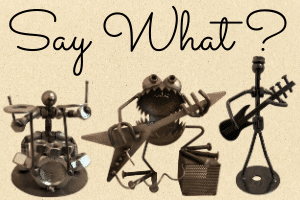
Please leave a comment below if you enjoyed this article, have any questions about distortion pedals, or want to give your point of view. I will be happy to help you.
- Do you use distortion pedals? Which one(s) do you like best?
- Which do you prefer pedal or amp distortion, or both? Why?
- Do you gain stack with more than one distortion pedal?
- What else is on your mind?

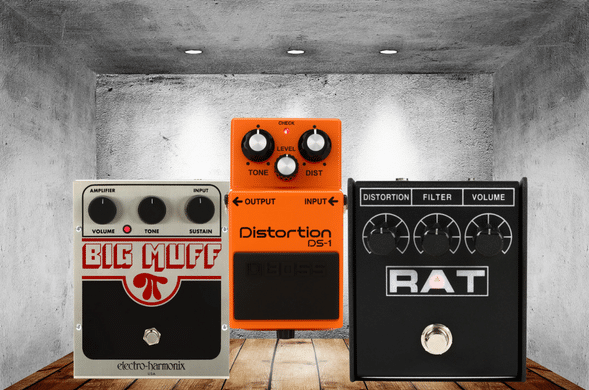

Hi Frank,
Thank you for your excellent article explaining everything anyone could possibly want to know about whether they needed a distortion pedal for their guitar set up.
What always fascinates me about guitar equipment, is that there are so many combinations that can be used, starting from the pick ups, through to the amps, pedals and everything else!
It’s a bit like cooking, in that you have all these separate ingredients that can be mixed in so many different ways to get a different sound each time. I guess that playing around with a guitar set up, like the many different ways you describe that distortion pedals can be used, is a life long journey of discovery!
Do you think anyone ever achieves their ‘perfect’ set up?
Thanks again
John
Hi, John
Thank You for your comments!
Yes, there are essentially unlimited ways to use all types of guitars, amplifiers, and effects to create musical sounds.
I can tell you that there’s no such thing as a “perfect” setup,” but some musicians feel they get close. Although some musicians are consistent almost to a fault with their equipment, things are constantly changing in terms of technology as well as a guitarist’s playing style and repertoire.
Perhaps you should give the guitar a try! 😎
Frank 🎸
Hi there Frank. Great article me I’m a strummer, just a few cords but I love the guitar. I like the way your site looks easy to follow and very informative and I will continue to follow your site. I’m not ready for a distortion pedal but if ever do I will know which to go. And when I’m ready I know who to contact for the right guitar to get. And thanks for sharing your knowledge.
Hi, Russell
I appreciate your comments!
Don’t worry about how good you play the guitar; just keep at it, and you will get better. Hey, why not grab the free ebook I wrote, which will give some new ideas to try on your guitar? It’s on my website, download it, and it’s yours!
You need an electric guitar if you don’t already have one to use a distortion pedal. It can enhance your sound if you play Rock, Metal, or Blues.
Let me know if there’s anything I can help you with.
Keep On Playing!
Frank 🎸
I love your emphasis on constant practice. In the same way, it works in another field as it does in music. Keep practising and you will get better and the best. In the same way, I also agree that not all music will give you the right sound with a distortion pedal. So the best option is constant practice and interaction with experts. That way you will get there
Hi, Ayodeji
Thank You for your comments!
Yes, practice is the true key to sounding excellent on the guitar or any other instrument. Distortion and other effects can make good music sound better but won’t do much for music that is not played correctly.
Frank 🎸
Hi, frank. thanks for the description of the distortion pedal. it always was my question.
my sister was playing classical guitar for a while and we both are interested in electric guitar.
I agree with you that practice is important to reaching a good level of a guitarist.
everything needs practice.
Hi, Liam
Thank You for your comments!
Yes., “Practice makes perfect!”
The best approach is to get an electric guitar and amp and see what music you enjoy playing most. If you are playing a lot of Rock, Metal, or Blues, then a distortion pedal might be a good investment for you.
Frank 🎸